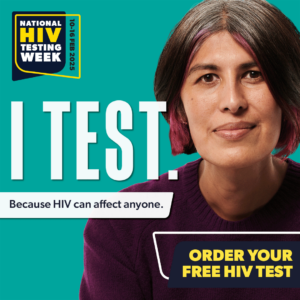 PEOPLE across East Sussex are being encouraged to test regularly for HIV, as part of a national awareness week which starts on Monday 10 February.
PEOPLE across East Sussex are being encouraged to test regularly for HIV, as part of a national awareness week which starts on Monday 10 February.
The council is backing the National HIV Testing Week campaign ‘I test’, which aims to encourage more people to get tested to help stop the spread of the virus.
There were 30 new HIV diagnoses in East Sussex in 2022.
Darrell Gale, East Sussex Director of Public Health, said: “HIV testing is quick, confidential and free. Most people contract HIV from someone who doesn’t know they have it and testing is the only way for people to learn their HIV status.
“The sooner you start treatment the less likely you are to become seriously ill and can avoid passing the virus on to anyone else. People who are diagnosed early and get treatment can expect to live a normal lifespan.”
In the three-year period between 2020 and 2022, nearly 1 in 3 people diagnosed with HIV in East Sussex were diagnosed at a late stage of infection.
A late HIV diagnosis is when someone tests positive for HIV after the virus has already damaged their immune system. This can lead to poorer health outcomes and an increased risk of transmitting the virus to others.
Free finger-prick tests, delivered in discreet packaging, can be ordered online at www.eastsussexsexualhealth.co.uk with the results available by text within a few days.
Over 7,500 online HIV tests were completed by East Sussex residents in 2024.
Darrell Gale continued: “This year’s National HIV Testing Week campaign is an important opportunity for us to get back on track to end new HIV cases by 2030 in England.
“We won’t be able to end new HIV transmissions without increasing testing and reaching people who do not currently test for HIV.
“It’s recommended everyone tests for HIV at least once a year and more regularly if you’ve had unprotected sex or more than one partner.
“I’d urge anyone who thinks they may be at risk of having HIV to take the test as soon as possible.”
Anyone diagnosed with HIV in the UK can access free treatment and support.
Anyone who does not have HIV may be able to take pre-exposure prophylaxis (PrEP) medicine to reduce their risk of getting the virus.
PrEP is offered free to East Sussex residents through clinics and online through the country’s first online PrEP service. For more information about accessing PrEP in East Sussex, visit www.sh.uk/prep/all-about-prep.
Further advice and support around HIV, sexual health, and contraception can be found on the East Sussex Sexual Health website, www.eastsussexsexualhealth.co.uk.
The website includes links to access free condoms, which are an effective form of protection against HIV and other sexually transmitted infections (STIs), information on PrEP, and free home STI testing information.
Information about HIV testing is also available at www.startswithme.org.uk.


